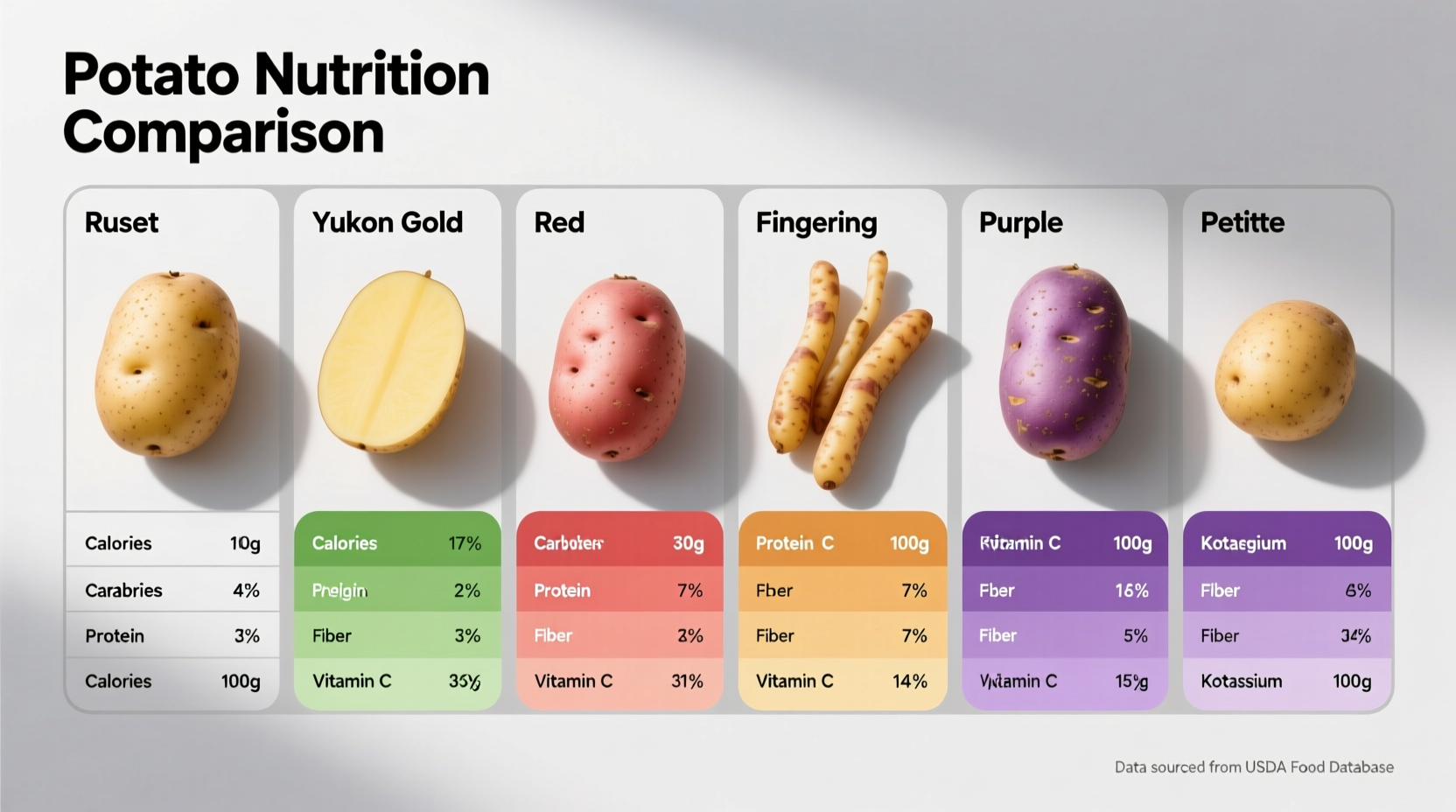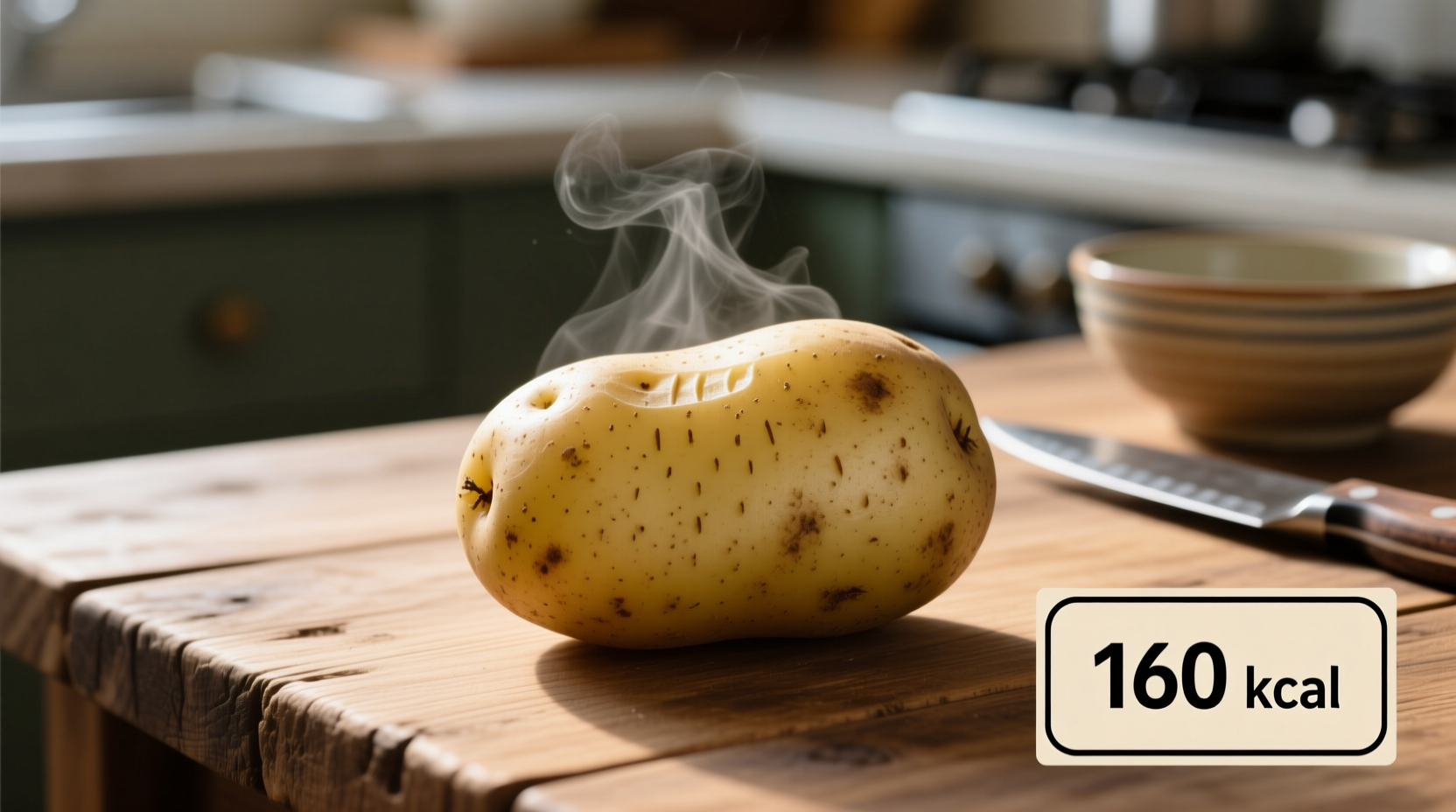Understanding potato nutrition is essential for making informed dietary choices. Whether you're managing weight, tracking macros, or simply curious about this staple food, knowing exactly how many calories are in a potato helps you incorporate it wisely into your meals.
Exact Calorie Counts by Potato Type
Not all potatoes are created equal when it comes to calorie content. The USDA FoodData Central provides precise measurements for different varieties. Here's what the data shows:
| Potato Type | Raw (per 100g) | Boiled with Skin | Baked | Fried |
|---|---|---|---|---|
| Russet | 79 kcal | 93 kcal | 95 kcal | 150 kcal |
| Yukon Gold | 77 kcal | 90 kcal | 92 kcal | 145 kcal |
| Red Potato | 70 kcal | 85 kcal | 87 kcal | 140 kcal |
| Sweet Potato | 86 kcal | 90 kcal | 91 kcal | 160 kcal |
This comparison reveals important nutritional differences you should consider when planning meals. Russets contain slightly more calories than red potatoes, while sweet potatoes offer different nutritional benefits despite similar calorie counts.
How Cooking Methods Transform Calorie Content
The way you prepare potatoes dramatically affects their calorie density. Understanding these changes helps you make smarter choices:
- Boiling: Minimal calorie increase (about 15-20% more than raw) as potatoes absorb water
- Baking: Slightly higher calories than boiling due to water loss concentrating nutrients
- Frying: Calorie content nearly doubles as potatoes absorb oil during cooking
- Air frying: About 25% fewer calories than traditional frying while maintaining texture
According to research published in the Journal of Food Composition and Analysis, leaving the skin on during cooking preserves more nutrients and adds fiber without significantly increasing calories. The skin contains nearly half the potato's fiber content, which helps with satiety and blood sugar management.

Practical Portion Guidance for Different Dietary Goals
Knowing how many calories are in a potato is just the beginning. Here's how to apply this information based on your specific needs:
For Weight Management
A medium potato (about 150g) provides approximately 130 calories when boiled with skin. This makes it a satisfying, nutrient-dense option that can replace higher-calorie carbohydrates in your meals. Pair with lean protein and non-starchy vegetables for balanced nutrition.
For Athletes and Active Individuals
Potatoes offer excellent carbohydrate content for energy replenishment. A large baked potato (300g) provides about 285 calories and 63g of carbohydrates - ideal for post-workout recovery when paired with protein.
For Blood Sugar Management
While potatoes have a higher glycemic index than some other vegetables, cooling cooked potatoes increases resistant starch content by up to 50%, according to research from the National Center for Biotechnology Information. This modification helps moderate blood sugar response.
Common Misconceptions About Potato Calories
Several myths persist about potato nutrition that deserve clarification:
- "Potatoes are fattening" - Potatoes themselves aren't inherently fattening; preparation method and portion size determine their impact on weight
- "All potatoes have the same calories" - Different varieties have varying starch and water content affecting calorie density
- "Sweet potatoes are always healthier" - Both types offer unique nutritional benefits; regular potatoes provide more potassium while sweet potatoes offer more vitamin A
When Potato Calories Matter Most
Understanding context boundaries helps determine when precise calorie counting for potatoes becomes important:
- Strict calorie-controlled diets: When tracking within 100-200 calorie ranges, potato preparation method significantly impacts daily totals
- Pre-competition meal planning: Athletes benefit from precise carb loading calculations
- Diabetes management: Monitoring carbohydrate content becomes crucial for blood sugar control
- Casual healthy eating: For general wellness, focusing on preparation method and portion size matters more than exact calorie counts
For most people following balanced diets, the quality of calories matters more than the exact count. Potatoes provide valuable nutrients including potassium, vitamin C, and fiber that contribute to overall health beyond simple calorie considerations.
Maximizing Nutritional Value While Managing Calories
You can enjoy potatoes while keeping calorie intake in check with these practical strategies:
- Cool cooked potatoes before eating to increase resistant starch by up to 50%
- Always eat potatoes with the skin on for added fiber and nutrients
- Choose baking or boiling over frying to significantly reduce calorie content
- Pair potatoes with protein and vegetables to create balanced, satisfying meals
- Use herbs and spices instead of high-calorie toppings like butter and sour cream
Remember that a potato's nutritional profile extends far beyond its calorie count. As noted by the USDA MyPlate guidelines, potatoes contribute to your daily vegetable intake and provide essential nutrients that support overall health.
Frequently Asked Questions
How many calories in a small potato?
A small potato (about 100g) contains approximately 77-93 calories when boiled with skin, depending on the variety. Russet potatoes have slightly more calories (93) than red potatoes (85) at this size.
Do potatoes lose calories when cooked?
No, potatoes don't lose calories when cooked - the calorie content per 100g actually increases slightly due to water loss. However, the total calories in a whole potato remain the same. What changes is the calorie density (calories per gram) as water evaporates during cooking.
Are potatoes good for weight loss?
Yes, potatoes can be part of a weight loss diet when prepared healthily. Their high fiber and water content promote satiety. A medium boiled potato has only about 130 calories and provides significant potassium and vitamin C. The key is preparation method - avoid frying and high-calorie toppings.
How many calories in a baked potato with skin?
A medium-sized baked potato with skin (about 150g) contains approximately 145 calories. The skin adds fiber and nutrients without significantly increasing calorie content - about 20 calories more than a peeled potato of the same size.
Which potato has the lowest calories?
Red potatoes generally have the lowest calorie content among common varieties, with about 70 calories per 100g when raw. When cooked, they maintain a slight edge over Russets and Yukon Golds, containing approximately 85 calories per 100g when boiled with skin.











 浙公网安备
33010002000092号
浙公网安备
33010002000092号 浙B2-20120091-4
浙B2-20120091-4